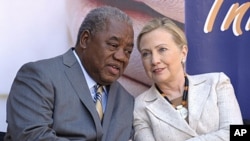U.S. Secretary of State Hillary Clinton says the death of a man suspected of organizing the 1998 bombings of American embassies in Kenya and Tanzania is a significant blow to al-Qaida.
Secretary Clinton says Harun Fazul's death is “a significant blow to al-Qaida, its extremist allies, and its operations in East Africa.” After laying flowers at a memorial for the 12 Tanzanians killed here in Dar es Salaam, Clinton spoke to a small gathering of embassy staff. “Some of you lost your friends and loved ones, and all Americans grieved with you then, and we have not forgotten your losses. And we have also not forgotten our pledge to seek justice against those who would commit such atrocities," she said.
Clinton says al-Qaida suffered a major setback last month with the death of Osma bin Laden and has now suffered another significant blow with Harun Fazul's death in Somalia. “He was actually one of the men, if not the leader, of those responsible for the attacks on this embassy and the bombing of our embassy in Nairobi and many other despicable acts that killed hundreds and wounded thousands of people - Tanzanians, Kenyans, Somali, and our own embassy personnel," she said.
Clinton says nothing can replace those killed by what she calls “such senseless violence,” but she says she knows justice was served and hopes that gives some measure of comfort.
Somali authorities say the man believed to be al-Qaida's leader in East Africa, who is also known as Fazul Mohammed, was killed during a confrontation with police in Mogadishu. The police say he was carrying thousands of dollars in cash and multiple identity documents, including a suspicious South African passport.
Because of his suspected involvement in the Nairobi and Dar es Salaam bombings, the United States offered a $5-million reward for his capture.
President Obama's assistant for homeland security and counterterrorism, John Brennan, says the death is a measure of justice to so many who lost loved ones because of his actions. Brennan says the Obama administration commends the efforts of Somali government forces, “whose actions against Fazul struck a significant blow against those in the region seeking to carry out terrorist attacks.”
The bombing of the U.S. embassies in Kenya and Tanzania 13 years ago killed 224 people and wounded nearly 5,000 others. Bombs exploded in the two capitals minutes apart, without advance warning, and security officials quickly determined the coordinated attack was carried out by the al-Qaida network.
Four men involved in the attacks were convicted in the United States and sentenced to life in prison, but U.S. authorities were still actively seeking Fazul Mohammed and other suspects.
Clinton: Death of Embassy Bombing Suspect Big Blow to al-Qaida




